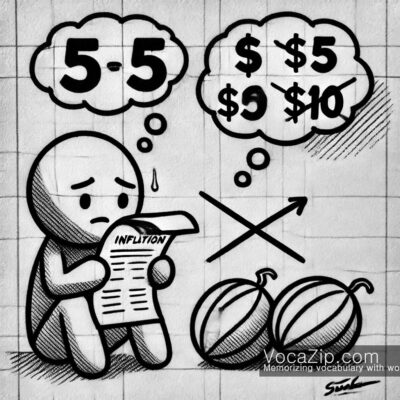inflation meaning
inflation :
a general price increase, rising prices
noun
▪ The inflation has caused prices to go up.
▪ The rising prices have caused costs to increase.
▪ High inflation can reduce purchasing power.
▪ High prices can make money worth less.
paraphrasing
▪ price rise – a general increase in prices
▪ price growth – the rising of prices
▪ cost increase – when costs go up
▪ economic growth – rise in economic activity

Pronunciation
inflation [ɪnˈfleɪʃən]
The stress is on 'fla', and it sounds like 'in-fley-shun'.
Common phrases and grammar about inflation
inflation - Common meaning
noun
a general price increase, rising prices
Part of Speech Changes for "inflation"
▪ inflationary (adjective) – related to inflation
▪ deflation (noun) – decrease in prices
Common Expressions with "inflation"
▪ high inflation – when prices rise a lot
▪ inflation rate – the speed at which prices increase
▪ control inflation – to stop prices from rising
▪ inflation problem – issue with rising prices
Important examples of inflation in TOEIC
Vocabulary examples from the TOEIC test
In TOEIC word questions, inflation is used to describe the general rise in prices.
Example of a confusing word: deflation (a decrease in the general price level)
Grammar examples from the TOEIC test
In TOEIC grammar questions, inflation is used as a noun and may be subject or object.
inflation
Idioms and fixed expressions in TOEIC
price inflation
the increase in price levels
battle inflation
to fight against rising prices
Differences between similar words and inflation
inflation
,
deflation
differences
Inflation refers to a general rise in prices, while deflation refers to a general decrease in prices.
inflation
,
price increase
differences
Inflation is the overall rise in prices, while a price increase refers to specific items' price rise.
Words with the same origin as inflation
The origin of inflation
Inflation comes from the Latin 'inflare', meaning 'to blow into or enlarge'.
Word structure
The word is divided into the prefix 'in-' (into), root 'flate' (to blow), and suffix '-ion' (noun). Thus, inflation means 'the action of blowing into'.
Words with the same origin
The root of inflation is 'flate' (to blow). Words with the same root include 'inflate', 'deflate', 'flatulence', 'flatus'.






